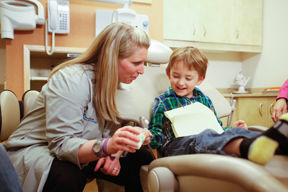(NewsUSA)
Because February is National Children’s Dental Health Month, it’s the perfect time to “brush up” on instilling good oral-hygiene habits.
Consider this: according to the American Academy of Pediatric Dentistry (AAPD), nearly one in three children ages two to five years old in the U.S. are affected by tooth decay, which is one of the top chronic infectious diseases among children and can compromise their health, development, and quality of life in both the short and long term.
“Parents are bombarded with unsolicited advice and health findings that are constantly changing,” says Dr. Jade Miller, AAPD President. “We don’t want to add to that stress, but there are a few common misconceptions, that could help make a huge difference in your child’s oral health — which is linked to their overall health and wellness.”
The good news is that tooth decay is nearly 100 percent preventable. The following do’s and don’ts from the AAPD can keep tooth decay at bay and keep kids smiling for years to come:
*Do cut down on sugar. Children shouldn’t graze on candy and sugary drinks (including sports drinks and juice). That prolonged exposure to sugar and acid can wreak havoc on teeth. Instead, stick to designated meal and snack times and have them drink plenty of water throughout the day.
*Don’t put babies to bed with a bottle. Milk and juice contain sugar. When babies are put to bed with a bottle, the sugar coats their teeth while they are sleeping, causing tooth decay. If you use a bottle before sleep, opt for water.
*Do wean children off of pacifiers by age three. Pacifiers are a natural way for children to self-soothe. However, prolonged use can increase the risk of cavities, and affect the way a child’s teeth bite together often causing an overbite.
*Do avoid topical teething gels and rings. The U.S. Food and Drug Administration warns against using teething gels that contain benzocaine or lidocaine because they can harm your child. Parents and caregivers should stay away from teething rings too which contain chemicals, and low levels of BPA– despite labels citing otherwise — that can be harmful to your child.
For more information about children’s oral health and to find a pediatric dentist in your area, visit www.mychildrensteeth.org.

